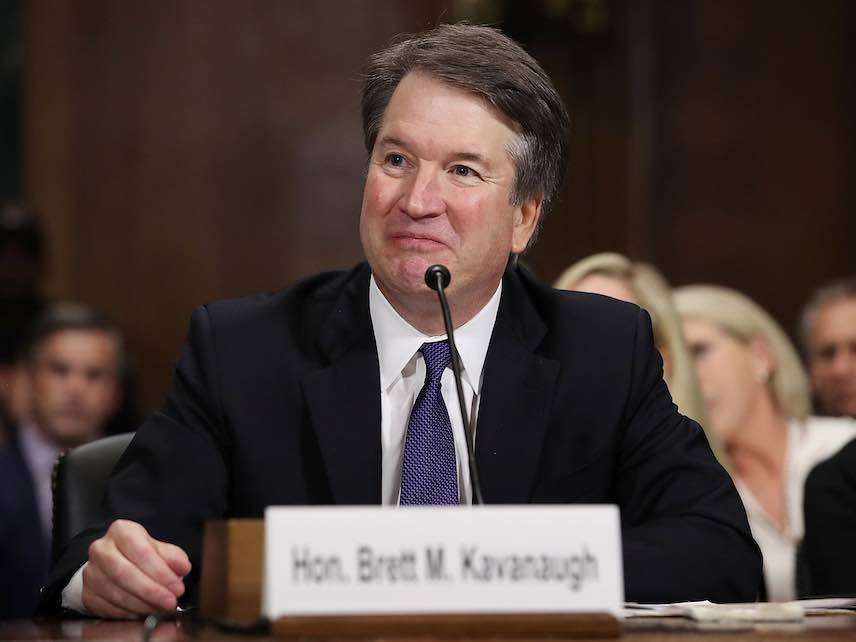Julie Swetnick Told NBC Her Brett Kavanaugh Story, and She Has Serious Credibility Issues
Michael Avenatti's client contradicted her previous claims, can't say the judge was actually involved.

Julie Swetnick, the third woman to accuse Supreme Court nominee Brett Kavanaugh of sexual misconduct, sat down for an interview with NBC News' Kate Snow, portions of which aired on MSNBC Monday night. The story Swetnick told strains credulity.
In the course of the interview, Swetnick contradicted her previous written statement, jumbled the timeline of her decision to come forward, and expressed uncertainty about whether Kavanaugh was actually involved in her own assault. She also borrowed a few key phrases from the story told by Christine Blasey Ford, the initial Kavanaugh accuser who testified before the Senate Judiciary Committee last week. In stark contrast to Ford, Swetnick was neither persuasive nor believable.
This was not lost on Snow, who cautioned that NBC could not corroborate Swetnick's story, and had discovered that several of her proposed witnesses were deceased. One person whom Swetnick claimed attended the house parties with her—parties at which women were routinely sexually assaulted, according to Swetnick—told NBC he didn't know her.
"This morning, Swetnick provided four names of friends she says went to the parties with her," said Snow. "One of them says he does not recall a Julie Swetnick. Another of the friends is deceased. We've reach out to the other two, but haven't heard back."
There were other, significant issues. She was confused about the timing of the Kavanaugh nomination, first suggesting that she thought about coming forward when she learned Kavanaugh had been shortlisted for the Supreme Court, but later suggesting that it was Ford's decision to speak out that prompted her. Swetnick's failure to recall whether something happened in July or September does not inspire great confidence that she can accurately recall events from three decades ago.
She described Kavanaugh as a frequent presence at the house parties she was attending in the early 1980s in Montgomery County, and she claimed Kavanaugh and his friends frequently wore their Georgetown Prep uniform because "they were very proud." Kavanaugh was a mean drunk, groped women, and might have participated in gang rapes, according to Swetnick.
But there's good reason to doubt this part of her story. In her sworn written statement, Swetnick claimed Kavanaugh would spike girls' drinks—and yet, in her interview with Snow, Swetnick merely claimed that she saw Kavanaugh near the punch bowl.
"I did see him giving red solo cups to quite a few girls," said Swetnick. "I saw him around the punchbowls. I don't know what he did."
Swetnick also claimed in her initial statement that the boys at these parties would line up outside bedrooms, waiting their turn to rape the incapacitated women inside. But she told Snow that the boys were merely huddled near the doorways of the rooms.
"I would see boys standing outside rooms, congregated together, sort of like a gauntlet," she said. "I would see them laughing."
It seemed quite possible Swetnick was reading far too much into this.
According to Swetnick, she was sexually assaulted at one of these parties. She could not say with any certainty that Kavanaugh was involved. She recalled being "shoved into a room" and hearing laughter, and that Kavanaugh and his friend Mark Judge were present. These are details that resemble Ford's story so closely it raises suspicion (of Swetnick, not of Kavanaugh).
Swetnick claimed she told her mother and a specific police officer about the assault; both are deceased. NBC is working to obtain the officer's files from the time period. If a record exists of her speaking with this officer, it will bolster her credibility. For now, this is by far the sketchiest of the accusations against Kavanaugh.
Swetnick is represented by Michael Avenatti, who also serves as the attorney for adult film actress Stormy Daniels. Snow asked Swetnick why she would go to Avenatti with this information, given that many in the media distrust his motivations. Swetnick was unapologetic—she said she found the right man for the job.


Show Comments (290)